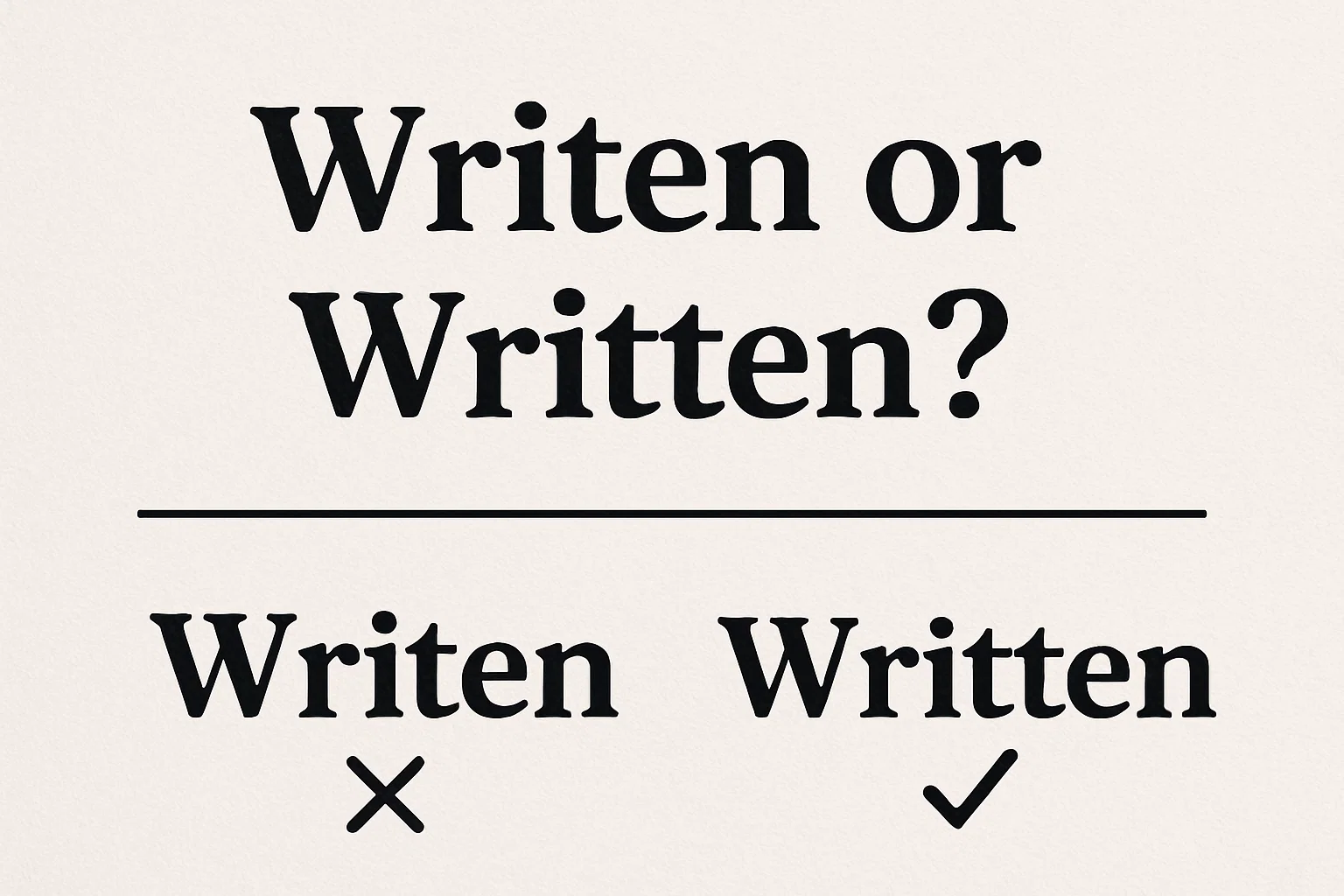Have you ever typed “writen” and paused, wondering if it looked right? You’re not alone! Many English learners get confused between writen and written, but only one is correct. The word “written” is the past participle of write, an irregular verb in English that doesn’t follow the normal spelling pattern. It’s often used in both professional writing and literary compositions, whether as a verb or an adjective.
On the other hand, “writen” is just a common spelling mistake. In this article, we’ll explain the correct spelling, show examples of proper English usage, and help you avoid this grammar mistake in your own written communication. Let’s fix the confusion once and for all!
Key Takeaways
- ✅ “Written” is the correct spelling and the past participle of write.
- ❌ “Writen” is a common spelling mistake and should be avoided.
- 📚 Write is an irregular verb in English, so its forms must be memorized: write – wrote – written.
- ✍️ Written can also be used as an adjective to describe things like exams, essays, or documents.
- 🧠 Using the correct spelling improves your written communication, professional writing, and credibility.
- 🔍 Always check for spelling mistakes using tools or proofreading to avoid errors like “writen”.
- 📖 Mastering English verb forms and proper grammar usage helps create clear and polished writing.
Writen or written? Which form is correct?
The simple answer is—“written” is correct, and “writen” is not. When you’re writing in English, it’s important to know the proper spelling of words. The word “written” is the past participle of write, which means it shows that something was already done or completed. For example: She has written a letter. This follows the correct English verb form for irregular verbs, like write → wrote → written.
On the other hand, “writen” is just a spelling mistake. You won’t find it in a dictionary because it doesn’t follow any real grammar rules. Using the wrong word can make your written communication look unprofessional. So, learning the correct spelling and using it the right way helps your writing sound clearer, more polished, and more confident.
Writen or written? The incorrect form
Many people accidentally type “writen” thinking it’s just a shorter version of “written”, but that’s not true. “Writen” is an incorrect spelling and isn’t recognized in proper English. It’s a common spelling mistake made by learners and even native speakers who are unsure about certain English verb forms.
The word “written” comes from the irregular verb in English, write, and it’s used as the past participle of write. English doesn’t always follow simple rules like adding “-ed” to a verb. That’s why it’s so important to memorize forms like write – wrote – written. Using the wrong form, like “writen”, can affect your professional writing, reduce clarity, and make your message look careless.
Understanding the Difference
Knowing the difference between “writen” and “written” helps you avoid embarrassing mistakes in your written communication. The word “written” is the correct spelling and the official past participle of write. It’s used to show that something has already been completed—like in the sentence, I have written my homework.
In contrast, “writen” is just a spelling error. It doesn’t follow any proper English grammar rules, and using it can confuse your readers or make your professional writing seem rushed. Since write is an irregular verb in English, you can’t just add “-ed” like you would with regular verbs. So always use “written”, the correct form, whether you’re crafting emails, essays, or literary compositions.
The Importance of Correct Spelling
Using the correct spelling like “written” instead of “writen” shows that you care about clarity, accuracy, and detail. In both casual messages and professional writing, even small mistakes can make a big difference. A simple spelling error can distract your reader or make your message look unpolished.
Words like “written” come from irregular verbs in English, so it’s not always easy to guess their forms. That’s why learning the proper English verb forms matters. Correct spelling also strengthens your written communication and builds trust with readers. Whether you’re writing emails, reports, or literary compositions, using the right words shows confidence, understanding, and respect for language.
Written as a Past Participle
Written is the past participle of write, which means it describes an action that has already happened. You use it with helping verbs like have or had to show completed actions. For example, She has written a beautiful poem or They had written the report before the meeting.
Since write is an irregular verb in English, it doesn’t follow the usual “-ed” pattern. Instead, the past participle is always written—never writen. Using the correct past participle form is important for clear, professional writing and helps your readers understand exactly when things happened. This is a key part of good grammar rules in English.
Irregular Verbs in English
English has many irregular verbs that don’t follow the regular pattern of adding “-ed” to form the past tense or past participle. One important example is the verb write. Its forms are: write (base), wrote (past tense), and written (past participle).
Because of this, you can’t just guess or apply the usual spelling rules. That’s why it’s easy to get confused and write “writen” by mistake. Knowing these English verb forms is key to using verbs correctly in your written communication and everyday speech. Learning irregular verbs helps improve your grammar and makes your writing more professional and clear.
Avoiding Common Misspellings
Spelling mistakes like “writen” instead of “written” are easy to make, especially when you’re typing fast or unsure of the correct English verb forms. But small errors can make your professional writing look careless. The best way to avoid this is to understand how irregular verbs in English work and memorize their correct forms.
To improve your written communication, use spell-check tools, read your work aloud, and always double-check tricky words. Keep a list of common spelling mistakes so you can watch out for them. Remember, the correct spelling is always “written”, and sticking to proper grammar rules helps your message stay clear, polished, and easy to trust.
Written as an Adjective
Besides being a past participle of write, written also works as an adjective. That means it can describe or give more detail about a noun. For example, in phrases like written exam, written agreement, or well-written story, the word “written” tells us something about the kind of exam, agreement, or story.
Using written as an adjective is common in professional writing, education, and legal documents. It adds clarity and precision to your message. On the other hand, using “writen” instead of “written” is a common spelling mistake that can damage your credibility. So learning how to use it properly helps strengthen both your grammar and your written communication.
The Significance of Proper Grammar
Using proper grammar is more than just following rules—it shows you care about how your message sounds and feels. Choosing the correct word, like “written” instead of “writen”, reflects attention to detail and helps build trust with your readers. It keeps your written communication clear, polished, and easy to understand.
Grammar also helps your writing feel more professional. For example, using the right English verb forms, especially for irregular verbs in English, ensures your sentences make sense and flow smoothly. When you follow correct grammar rules, you avoid common spelling mistakes and leave a strong impression, whether you’re writing an email, a school paper, or a literary composition.
The Role of Written Language in Literature
Written language plays a powerful role in shaping literary compositions. Authors use it to express emotions, share ideas, and paint vivid pictures in the minds of readers. The correct use of words like “written” adds clarity, emotion, and rhythm to storytelling. Whether it’s a poem, novel, or article, well-crafted writing depends on solid grammar and the accurate use of English verb forms.
Using “writen” instead of “written” would break that flow and distract readers. Great literature relies on mastering irregular verbs in English, choosing the right words, and avoiding common spelling mistakes. When used properly, written language becomes a tool that brings stories to life and leaves a lasting impact.
Related Article: Deem Fit Meaning, Usage, and Examples
The Power of Written Communication
Written communication is one of the most powerful tools in both personal and professional life. From job applications to emails, reports, and essays, the words you write reflect your clarity, confidence, and attention to detail. Using correct forms like “written” instead of “writen” shows you understand proper grammar rules and care about your message.
Mistakes like using the wrong English verb forms or making common spelling mistakes can hurt your credibility. Since write is an irregular verb in English, its forms—write, wrote, and written—must be memorized. Mastering these helps you create clear, error-free content that builds trust and leaves a strong impression through every piece of written communication.
Writen or written? More examples from the literature and press
Seeing “written” used correctly in real texts helps you remember its proper form and usage. Here are some clear examples from literary compositions and trusted publications that show how this past participle of write appears in everyday and professional contexts:
- “The author’s beautifully written prose transported readers to another world.” – Fiction novel
- “Take Mr. Pip’s written order and pay him twenty pounds.” – Charles Dickens, Great Expectations
- “And then, exactly a year ago, Hogwarts had written to Harry.” – J.K. Rowling, Harry Potter
- “Your job is to enforce the laws as Congress has written.” – Washington Times
Each quote highlights the importance of using the correct spelling, avoiding common spelling mistakes, and strengthening your written communication with proper English verb forms.
Conclusion
To sum it up, “written” is the only correct form, and “writen” is just a spelling mistake. Since write is an irregular verb in English, its forms don’t follow regular patterns—you need to memorize them: write, wrote, written. Using the right word helps your written communication sound clear, smart, and professional.
Whether you’re writing a story, email, or school paper, spelling matters. Mistakes like “writen” can confuse your reader and affect your message. So always use “written”, stick to good grammar rules, and avoid those common spelling mistakes. It’s a small change that makes a big difference in how your writing is understood and respected.
Frequently Asked Questions
Is “writen” a correct word in English?
No, “writen” is not correct. It’s a common spelling mistake and should always be replaced with the proper word “written” in all contexts.
What is the past participle of “write”?
The past participle of “write” is “written”, used to show completed actions in perfect tenses. It follows irregular verb patterns in English grammar.
Can “written” be used as an adjective?
Yes, “written” works as an adjective to describe exams, instructions, or documents. It adds detail and clarity to your written communication.
Why is “writen” considered a spelling mistake?
“Writen” breaks standard grammar rules and doesn’t follow correct English verb forms, making it an incorrect and unprofessional spelling in all written work.
How can I avoid spelling mistakes like “writen”?
You can avoid errors by using spell-check, proofreading, reading aloud, and memorizing irregular verbs in English like write, wrote, and written.

